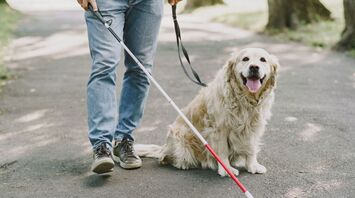People with guide dogs can't call a taxi in Britain: how the authorities are fighting discrimination

People with disabilities often face problems when calling a taxi. Daniel Williams from Cardiff, who has retinitis pigmentosa, which means he is gradually losing his eyesight, has been relying on his guide dog for six years.
He doesn't drive and when he tries to hail a taxi, he has received more than 100 refusals from drivers over the past six years. The local authorities are trying to improve access to taxis for people with disabilities and put an end to the arbitrariness of taxi drivers, walesonline writes.
Daniel works on accessibility for people with disabilities. He is the founder of Visualize Training and Consultancy Ltd, which works with organizations to improve accessibility and inclusion for people with sight and/or hearing loss.
The city of Cardiff, the capital of Wales, is on the first place among those who most often refused passengers with a guide dog. The city authorities emphasized the need for drivers to comply with the law. They believe that refusing to take a passenger with a guide dog is an offense.
At the same time, a special app has been developed to improve service and notify drivers of violations.
"Guide Dogs has developed an app so that passengers can notify us of illegal access denials when they try to ride with their guide dog in a taxi. These cases are all too common in Wales. Of those reported to us in the 18 months to October this year, Cardiff led the league in refusals with 17," said Andrea Gordon, Head of External Affairs at Cymru.
Representatives of Dragon Taxis, a UK-based technology company in Cardiff, which is part of the Veezu Group, support the initiative of the authorities and are trying to combat discrimination against inclusive passengers.
"As there is a lot of talk in the industry about disability compliance, we fully support this initiative led by Visualize Training and Consultancy Ltd and the local authorities to pave the way for licensed drivers to be aware of their obligations to society. It is everyone's responsibility to eradicate discrimination," says Jeff Anderson, COO of Veezu.
"Thanks to the discussion of this issue, Cardiff Council has already seen significant improvements. First and foremost, volunteers and their assistance dogs helped with this issue by conducting a mystery shopper operation to check whether drivers refuse to pay fares because customers have an assistance dog.
It is noted that the experiment was successful, and during the operation, no driver refused to pay customers.
The founders of the guide dog organization also note positive changes. They hope that disability equality training will be central to the government's approach, so that all taxi drivers and private drivers understand their responsibilities and the consequences of refusal.
A guide dog is a specially trained dog that can help blind and visually impaired people move around outdoors and avoid obstacles.



















